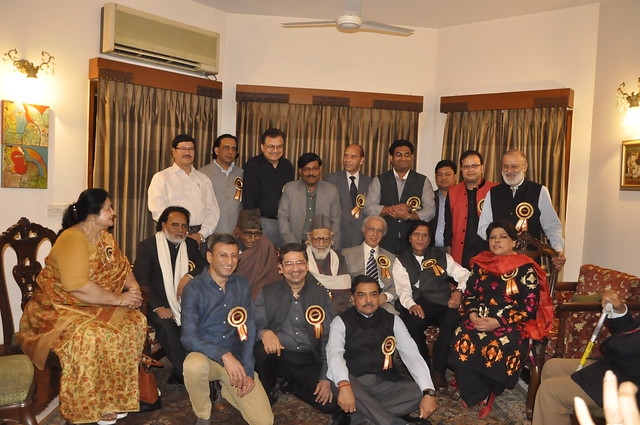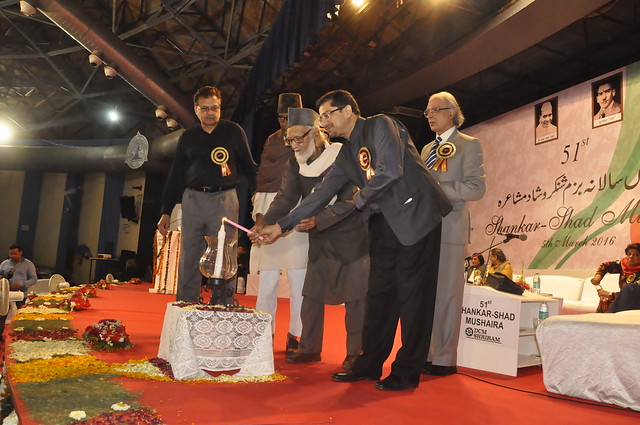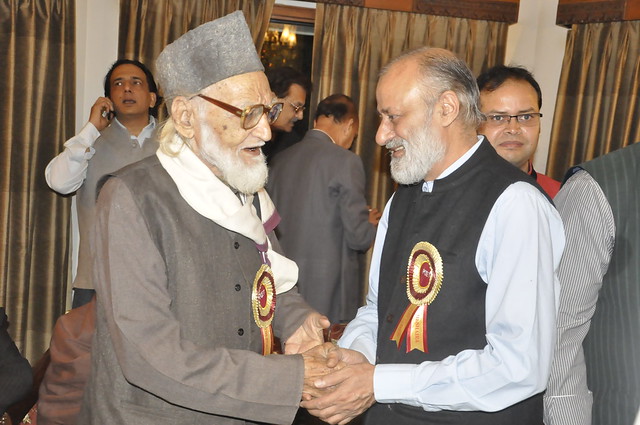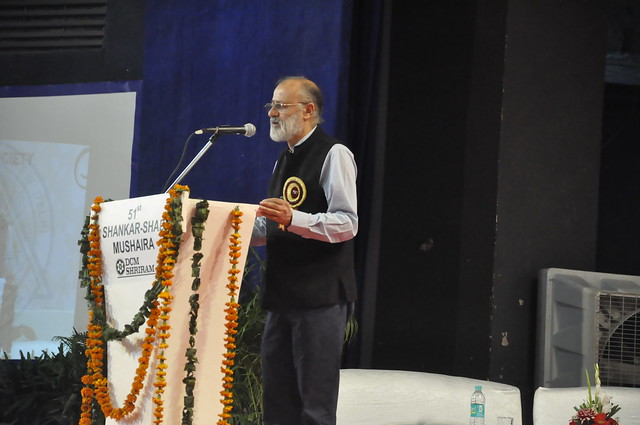By Bushra Alvi Razzack for Twocircles.net
Delhi: Dilliwalas can never get enough of Urdu poetry. In spite of inclement weather, Urdu lovers converged in large numbers last Saturday evening at the Sir Shankar Lall Hall of Modern School, Barakhamba Road for the 51st edition of the annual Shankar-Shad Indo-Pak Mushaira.

All the poets at a get together at Madhav Shriram’s house prior to the mushaira
It was an evening of poetical extravaganza made more enjoyable with the rain that drizzled outside, adding to the ambience of the evening. The stage was lit up, not just with the traditional ‘shama’ but with the luminaries of Urdu shaiyri – Pirzada Qasim (Karachi), Kishwar Naheed (Islamabad), Aziz Nabeel (Doha Qatar), Abdullah Sahib (USA) and Farhat Shahzad (NJ, USA) along with renowned poets from India; Javed Akhtar (Mumbai), Anwar Jalalpuri (Lucknow), Prof. Waseem Barelvi (Bareilly), Dr Popular Meeruti (Meerut), Iqbal Ashhar (Delhi), Dr Gauhar Raza (Delhi), Dr Iffat Zarrin (Delhi), Kunwar Ranjit Chauhan (Delhi), Dr Nawaz Deobandi, Dr Malikzada Manzoor Ahmad (Lucknow) and Bekal Utsahi (Balrampur) who regaled the audience with their deep and meaningful verses.

Bekal Utsahi, Madhav Shriram lighting the ‘Shamma’
Anwar Jalapuri shone in his role as master of ceremonies, a role that he has been playing since the past 5 years. Poetry plays a very important part in showing the way forward in society, he said. “Shaiyri ka kaam hai andheron se ladhna.”
The Shankar-Shad Mushaira, an initiative of DCM Shriram Industries Limited has been promoting Urdu mushaira as a genre of literature and the art of oration since 1953. This annual get-together is a legacy to commemorate the memory of Sir Shankar Lall and Sh. Murli Dhar of the DCM Conglomerate, who were known for their contribution to the social, educational and cultural life of New Delhi and patrons of Urdu poetry. This mushaira, assumed the character of literary institution of vital importance in Urdu Literature. Invitation for recitation saw their latest composition at the Shankar-Shad Mushaira and was considered an important landmark in the literary career of young Urdu Poets. The Mushaira helps to further Indo-Pak relationship, specifically Cultural togetherness – Urdu Poetry, common heritage of the Indian Sub-continent.

Bekal Utsahi (L) Gauhar Raza (R)
For Dr Iffat Zarrin, daughter of poet Mushir Jhanjhanvi and a worthy shaiyra in her own right, this is the second time she is attending the DCM mushaira. Speaking ahead of the Mushaira, Zarrin, who is a professor of Urdu at Delhi University said, “It’s a matter of great pride and honour to be invited to recite at this prestigious event,” For her, poetry is a powerful tool which can influence people and not just poetry but any form of literature has the power to influence and bring about a change. “Media plays such an important part of today’s life that if shaiyri comes to the fore through the agent of media, the impact will be greater.” Poetry, she elaborated, has the distinct advantage that whatever message has to be conveyed can be done so in the short space of a few well-chosen impactful words.
“Badi se badi baat kahiay, do lafzon mein utar jati hai aadmi ke dil mein.”
Stressing on the role of poetry in helping to unite people Gauhar Raza, scientist, activist, documentary film maker and poet par excellence elaborated that whether it is poetry or prose, dance or drama…anything that is art, unites you. And if it doesn’t unite you then it can be categorised into two parts. Either it is very bad or it doesn’t fulfil the objective of literature and poetry.

Janab Gauhar Raza Reciting
“All higher forms of art, especially poetry, if it doesn’t take you to the higher form of thoughtfulness, then it is not art. It should have the effect of change. It should touch you in some way,” stressed Raza. “After listening to good poetry, something should crack within your heart…something new should have emerged.”
And something did indeed crack in every heart when Gauhar Raza took the stage. At a time when there is so much unrest in the nation, one cannot ignore it and talk about “khoobsoorat pedh and khoobsurat aankhen” he said. It is inevitable that one talks of ‘siyasi muddey’.
He spoke about the harsh realities of the German gas chambers which he had seen and likened the situation in present times in the country to it.
If things continued the way they were, it didn’t augur very well for the country, he said. His shairs spoke of loss of freedom, anti-nationalism and the intense hate that is making us all so irrational.
Dharam mein lipti watan-parasti kya kya swaang rachaayegi
Masli kaliyaan, jhulsa gulshan, zard khizaa’n dikhlaayegi”
“Europe jis vehshat se ab tak sehma-sehma rehta hai
Khatra hai vo vehshat mere mulk mein aag lagaayegi
German gas-kadon se ab tak khoon ki badboo aati hai
Andhi vatan parasti humko us raste le jaayegi
Andhe kuein mein jhooth ki naao tez chali thi, maan liya
Lekin baahar raushan duniya tum se sach bulwaayegi
Nafrat mein jo paley-barhe hain, nafrat mein jo khele hain
Nafrat dekho aage-aage unse kya karwaayegi
Fankaaron se poochh rahe ho, kyon lautaaye hain sammaan
Poochho kitne chup baithe hain, sharm unhe kab aayegi
Ye mat khaao, vo mat pehno, ishq toh bilkul karna mat
Desh droh ki chaap tumhaare upar bhi lag jaayegi
Ye mat bhoolo agli naslein jalta shola hoti hain
Aag kuredoge chingaari daaman tak toh aayegi
Raza Sb’s stark verses struck a deep chord in every heart and resonated long afterwards.
Javed Akhtar recited one of his old but very relevant poems, Khel which captures the notion of existential angst through the metaphor of a game of chess. He questions the contradictions of life, of social oppression and injustice through his thoughts about the rules of chess.
Ye Khel Kya hai..
Mere mukhaalif ne chaal chal di hai
Aur ab
Meri chaal ke intezaar mein hai
Magar main kab se
Safed khaanon
Siyaah khaanon mein rakkhe
Kaale safed mohron ko dekhta hoon
Main sochta hoon
Ye mohre kya hain
Agar main samjhoon
Ki ye jo mohre hain
Sirf lakdi ke hain khilone
To jeetna kya hai haarna kya…
The evening ended with Bekal Utsahi’s rendition. It was indeed heartening to see the 94 year-old poet recite his verses with as much fire and passion as the other poets.
The thunderous applause, the accolades, the wah, wah’s and encores prove that Dilliwals have a fine ear for ghazals and nazms.
It is clear that this is a well-loved cultural gathering of the people of this city. Abdullah Khan, novelist, literary critic and screen writer has been attending mushairas from a very young age and been a regular at Shankar- Shad mushaira since the past 5 years. Since he is an aspiring poet, he feels that mushairas give him an opportunity to hone his skill. He also enjoys the ambience at this mushaira.
On the other hand, Dr Saif Mahmood, a Delhi-based lawyer and Urdu aficionado has been keeping a date with the Shankar Shad Mushaira since childhood. As a child he used to attend the mushaira with his grandmother (herself a poetry aficionado from the family of literary giants like Majaz and Chaudhary Mohammad Ali Rudaulvi) and later with his parents.
“In my memory, I have never missed the Shankar Shad Mushaira except once,” he said. “It is the quality of poets and the audience participation that draws me to such Mushairas. It was at the Shankar Shad Mushaira that I heard some of the greatest Urdu poets ever – Ahmed Faraz, Khumar Barabankvi, Jaun Elia, Majrooh Sultanpuri, Sheheryar, Zehra Nigah – I have waited beyond midnight and patiently listened to others, just to hear them recite. And then there was Dr Malikzada Manzoor compering the Mushaira which was a treat in itself. He made the art of “nizaamat” an independent genre in urdu culture.”
Now, with the fifth generation of the Shriram family also taking keen interest in organising this major event, aficionados of Urdu poetry can be sure they will never lack an opportunity to listen to the finest of shaiyari from the best of Indo-Pak poets. Mr Madhav Shriram’s beaming face and the huge appreciation from the audience is a testimony to the fact that the Shakar-Shad mushaira will always remain a high point in Delhi’s cultural calendar for generations to come.
(Bushra Alvi Razzack is a Delhi-based writer, editor and poet)

